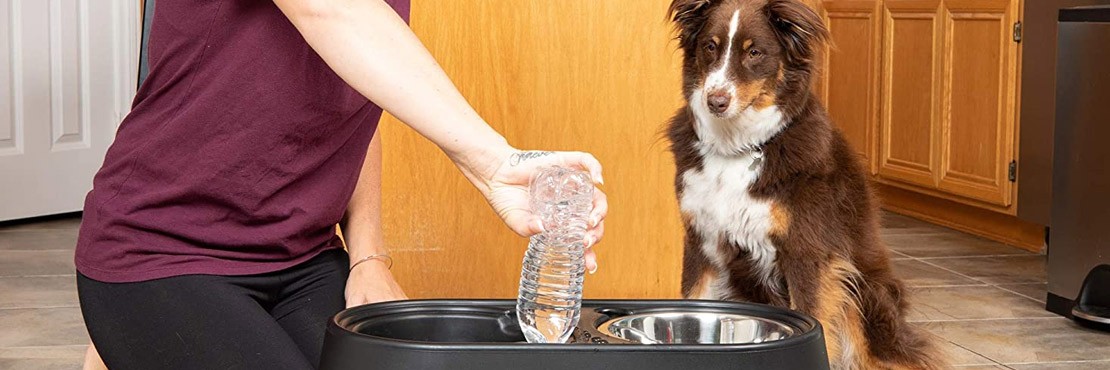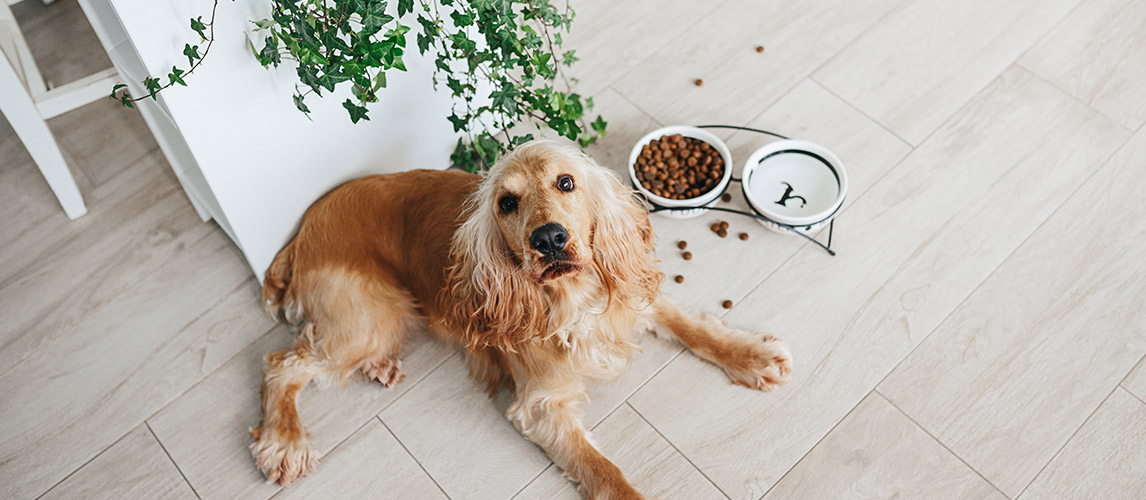Do you find that whenever you try to eat a meal or a snack, you have a pair of pleading eyes watching your every move? It is not uncommon for dogs to beg for food at the dinner table but it can be off-putting, especially if you have guests who may not understand dogs quite like you do! And it might not be just food your dog begs for – how often does he bark, whine or place his head on your lap for some affection or attention?
Fortunately, begging is a behaviour that can be prevented and in this article we will share a few tips to help you stop your dog begging.

Why Do Dogs Beg?
Firstly, we need to understand why dogs beg. When you enter a house and you notice the aroma of your favourite meal or treat, you probably gravitate towards it instinctively, especially if you are hungry. Bakeries inside supermarkets are usually strategically placed at the back of the store because the store designers know the smell of fresh bread will draw customers through the store. It is not surprising then, that dogs will also naturally gravitate towards food. If this natural instinct to gravitate towards food has led to an extra treat or tidbit in the past, a dog will very quickly learn that it is worth hanging around in future!
Dogs are very good at knowing how to get what they want from their owners and will repeat behaviours that have proved successful in the past. This may include pawing, barking, or whining in an attempt to get food, affection or a walk. If the behaviour has got the response the dog wanted previously they will quickly learn to do it again and again. As an owner, you may be reinforcing this habit without realising it – few of us can resist giving our dog a pat on the head when he rests his head on our lap, but actually, we are inadvertently giving in to our dog’s demand for attention.
So, if a dog’s instinct leads it to food and its behaviour prompts its owner to give it some food, a dog will quickly learn that begging is a successful way to get some tasty food and will repeat the behaviour many times over!
Similarly, if a dog performs a behaviour that gets some attention (even negative attention) he is likely to remember the behaviour and repeat it whenever he wants attention again.

How to Stop Your Dog Begging
As with many things, prevention is better than cure. If you can stop your dog from learning that begging may lead to food, it is easier than training him once he has learned the behaviour. However, if your dog has already learned the benefits of begging, it is not impossible to stop them from doing it. Here are some useful tips:
- Eat in a separate room. Perhaps the simplest way to ensure your dog leaves you alone while you are eating is to eat in a separate room. If you would prefer not to shut the dog away completely, you could use a dog gate to separate them so that they can still see you. Alternatively, if your dog is crate trained, you could put him in his dog crate while you are eating.
You May Also Like: Dog Crates
- Ignore any unwanted behaviours. All good dog training is based on ignoring unwanted behaviours and praising good behaviour and it is no different with begging. It is easy to give in to those puppy-dog eyes but it is important that your dog learns that begging won’t lead to food, affection or anything else he may be begging for. Remember that your dog is well-fed and cared for and don’t give in!
- Keep your dog busy. Another way to ensure you can eat in peace is to give your dog something else to concentrate on. This could be a chew, a toy stuffed with something tasty, or his own dinner (remember, he will probably eat much faster than you, so you may consider scattering his food or buying one of the slow-feed bowls to make him work a little harder for it).
- Set a feeding routine. Ensuring your dog eats at the same time in the same place every day will enable your dog to learn that this is his mealtime and therefore he may be less likely to want to interrupt yours.
- Set a play/exercise routine. Most dogs love routine. As well as a mealtime routine, it may also be helpful to have an exercise and playtime routine. Playing with your dog or taking him for a long walk before you eat may encourage your dog to be more relaxed or even nap while you are eating. Begging can also be a cry for attention so ensuring that you timetable a play or exercise session guarantees your dog will get the attention he craves and deserves.
- Don’t give your dog tidbits from your plate. As we have already discussed, dogs learn quickly. If you give your dog anything from your plate in response to him staring, barking, pawing etc, he is sure to try the same tactics again. Using “human food” like chicken or cheese as part of your dog’s training process is absolutely fine and contrary to some beliefs doesn’t lead directly to begging. Dogs are smart and can learn very specific rules so will happily learn that cheese is ok as a training reward but not ok from your plate – just so long as you don’t give it to him from your plate!
- Don’t use your dog as a vacuum cleaner! It can be very tempting to let your dog clean up a few crumbs on the floor, but doing this will lead to your dog hanging around every mealtime in the hope that you might leave something behind for him to clear up!
- Be consistent. It is very important that everyone in your dog’s life is consistent, so ensure that everyone in the household knows not to give in to your dog’s begging. This applies to visitors and is especially important when teaching children how to behave around dogs. Children may be tempted to slide a few vegetables from their plate towards a grateful dog. This reinforces the unwanted begging behaviour but could also lead to your dog eating something which may cause him harm.
- Avoid punishing your dog. Dogs love attention, even if it is negative so it is important that you don’t shout at or otherwise punish your dog for begging as even this kind of attention may be enough to prompt your dog to continue the behaviour.
- Don’t tempt your dog. Dogs are naturally curious and have exceptionally good noses. Therefore, whenever possible, try to keep food away from your dog to avoid temptation. Try not to leave food on kitchen worktops or coffee tables within your dog’s reach.
Related Post: Slow Feeder Dog Bowl

Dogs are naturally inquisitive and quick to learn so begging is a perfectly natural behaviour. Begging is also very easily inadvertently reinforced by well-meaning owners. Fortunately, begging can usually be prevented or stopped by following a combination of these tips, and making a few simple adjustments to your dog’s routine.
If these tips are not successful in stopping the begging behaviour, it may also be worth considering changing the food that your dog is eating. If your dog is missing something essential from his diet he may be begging for extra to make up for what he is missing. In some cases, it may also be worth considering a trip to the vet for some further tests as an excessive appetite could indicate an underlying medical issue.
Sources:
- Begging at the Table in Dogs, WebMD
- Rendy Schuchat, How to Stop Your Dog from Begging, wikiHow







